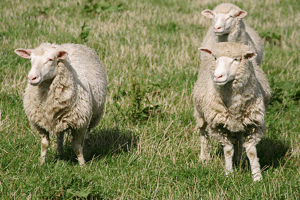Science Note: Belching Sheep
Air Date: Week of September 3, 2010

The belching culprits. (Photo: Marilyn Jane)
Sheep burps produce methane – a gas that contributes to climate change. Now researchers are suggesting a novel solution to minimize the greenhouse gas: seasoning the sheeps’ food. Living on Earth’s Amanda Martinez reports.
Transcript
MARTINEZ: Coriander, turmeric and a dash of cumin may sound like the ingredients of any good curry, but to a group of British scientists, the spices may be a recipe to fight climate change.
[THEME]
Step into a pasture full of grazing livestock and you’ll hear a lot more than moos and baas. You’ll also get an earful of belching. Such burps might be funny if it weren’t for the damage they do to the atmosphere. They release great quantities of methane, a greenhouse gas 30 times more potent than carbon dioxide.
But researchers at Newcastle University in the U.K. recently found that certain spices could significantly reduce these methane emissions. The scientists added crushed coriander, cinnamon, turmeric, cloves and cumin to a solution designed to mimic the mixture of fluids and microorganisms within a sheep’s gut. The spices function somewhat like an antibiotic, killing methane-generating bacteria, while still allowing beneficial bacteria to thrive. Coriander and turmeric were most effective, cutting methane release by 40 and 30 percent, respectively.

The belching culprits. (Photo: Marilyn Jane)
Providing digestive relief to the world’s nearly billion sheep would be a coup, as each animal emits 20 liters of methane daily. But the scientists’ next step is to see if the spices will also work for cattle. Each of the world’s 1.3 billion cows belches a whopping 500 liters of the heat-trapping gas every day. Given the similarities between the animals’ stomachs, the researchers are optimistic. The spices could prove a natural and inexpensive way to reduce the 18 percent of greenhouse gases livestock contribute to the atmosphere each year. Whether cows or sheep will favor the flavor of curry seasonings, however, remains to be seen.
And that’s this week’s note on Emerging Science. I’m Amanda Martinez.
Living on Earth wants to hear from you!
Living on Earth
62 Calef Highway, Suite 212
Lee, NH 03861
Telephone: 617-287-4121
E-mail: comments@loe.org
Newsletter [Click here]
Donate to Living on Earth!
Living on Earth is an independent media program and relies entirely on contributions from listeners and institutions supporting public service. Please donate now to preserve an independent environmental voice.
NewsletterLiving on Earth offers a weekly delivery of the show's rundown to your mailbox. Sign up for our newsletter today!
 Sailors For The Sea: Be the change you want to sea.
Sailors For The Sea: Be the change you want to sea.
 Creating positive outcomes for future generations.
Creating positive outcomes for future generations.
 Innovating to make the world a better, more sustainable place to live. Listen to the race to 9 billion
Innovating to make the world a better, more sustainable place to live. Listen to the race to 9 billion
 The Grantham Foundation for the Protection of the Environment: Committed to protecting and improving the health of the global environment.
The Grantham Foundation for the Protection of the Environment: Committed to protecting and improving the health of the global environment.
 Contribute to Living on Earth and receive, as our gift to you, an archival print of one of Mark Seth Lender's extraordinary wildlife photographs. Follow the link to see Mark's current collection of photographs.
Contribute to Living on Earth and receive, as our gift to you, an archival print of one of Mark Seth Lender's extraordinary wildlife photographs. Follow the link to see Mark's current collection of photographs.
 Buy a signed copy of Mark Seth Lender's book Smeagull the Seagull & support Living on Earth
Buy a signed copy of Mark Seth Lender's book Smeagull the Seagull & support Living on Earth

